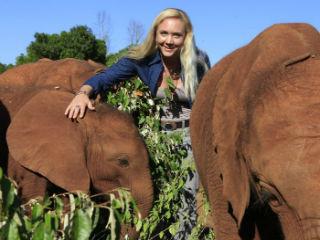Groups like Boko Haram and Al Shabaab are making an estimated $600,000 per week from the proceeds of poached ivory

Weber, who hopes to raise greater awareness of the “terrorist and criminal elements” linked to the trade in ivory, said, “There has been a terrible decline in elephant numbers in Africa – a report by Interpol estimates that, in the past 10 years, two thirds of African elephants have been decimated by poaching.”
by
Martin Banks
According to Vera Weber, President and CEO of Foundation Franz Weber, elephants in many African countries such as Sudan, Cameroon, Democratic Republic of Congo and Chad are targeted for their ivory. Ivory is then sold illicitly onto Asian markets where ivory products such as trinkets, statues and ornaments are bought as “status symbols.” “It is a lucrative trade. Some of the proceeds of the illegal ivory trade go directly to help finance the activities of groups like Al Shabaab” she told this website.
The Bern-based Weber said that in some cases, warlords in Africa were funding their terrorist acts from the illegal trafficking of ivory which “in turn fuels rebellion and political destabilization” for the whole continent. “In their pursuit for ivory these organisations are occupying vast tracks of wilderness and clearing forests for plantations in order to fuel their activities.” Weber, who hopes to raise greater awareness of the “terrorist and criminal elements” linked to the trade in ivory, said, “There has been a terrible decline in elephant numbers in Africa – a report by Interpol estimates that, in the past 10 years, two thirds of African elephants have been decimated by poaching.”
“This trade has become a lucrative source of income for terrorist groups and a very easy one at that. It’s hard to say exactly how widespread it is in Africa but these groups are reportedly making over $600,000 per week from it.” “They are responsible for the mass killings of elephants. They have the means to do this and rangers are, in the main, underfunded, undermanned and outgunned.” Asian countries like China and Hong Kong are particularly fertile markets for the ivory traffickers, she says, where an “upcoming middle class” seek out such products as “status symbols.” “There are over 1.5m Chinese in Africa and it is all too easy for some to fill up their diplomatic cases with illegally poached ivory and take it back to China.”
“But there is still a legal trade in ivory in Europe where antique and pre-convention ivory – ivory from before the creation of Convention on International Trade in Endangered Species (CITES) in 1976 – is sold in antique shops and at auctions. The EU can specifically help combat poaching in Africa by prohibiting its domestic trade in ivory,” said Weber. “We are calling on the EU and member states to close the domestic market altogether and support African nations in combatting the threat.” The African Elephant Coalition (AEC), which was established in 2008 in Bamako, Mali and comprises of 29 African countries, has submitted five proposals to be tabled at the 17th Conference of the Parties (CoP17) of CITES in September-October in Johannesburg, South Africa, aimed at providing the highest possible protection for African elephants.
The main proposal seeks to unify all African elephant populations in an Appendix I listing, which bans all international trade in ivory. Currently, the populations of Botswana, Namibia, South Africa and Zimbabwe are on an Appendix II listing, allowing for a potential trade. Another proposal calls for closure of all domestic markets for commercial trade in raw and worked ivory. The AEC list also endorses ivory destruction and encourages the highest possible standards of stockpile management.
Weber’s foundation is one of 59 NGOs from around the world who are calling upon governments to “respect the will” of the majority of African elephant range states in their efforts to overcome the scourge of poaching. At present the EU has not come out in support of the AEC’s proposals, which have astounded conservationists. In a statement released on 1st July the EU indicated they were still in favour of the status quo. Weber believes the EU needs to do more. She states: “The European Union must send a crystal clear signal that the ivory trade is unacceptable and that the African elephant deserves the highest level of international protection possible.”




 By: N. Peter Kramer
By: N. Peter Kramer
